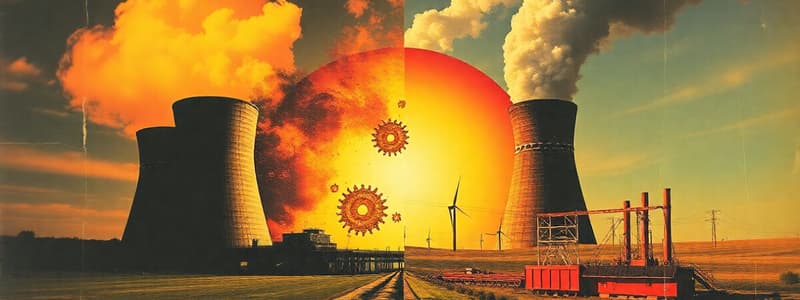Podcast
Questions and Answers
What is the primary use of the energy produced by nuclear reactors according to the text?
What is the primary use of the energy produced by nuclear reactors according to the text?
- To heat homes directly
- To power vehicles
- To conduct scientific research
- To generate electricity by producing steam (correct)
Nuclear fusion involves combining large atoms to release energy.
Nuclear fusion involves combining large atoms to release energy.
False (B)
Why is nuclear fission considered easier to achieve than nuclear fusion?
Why is nuclear fission considered easier to achieve than nuclear fusion?
Fission is initiated by shooting a neutron at an atom, while fusion requires extremely high energies to overcome the repulsion between positively charged nuclei.
In nuclear fission, after the reaction, the materials left over are often both ______ and chemically active.
In nuclear fission, after the reaction, the materials left over are often both ______ and chemically active.
What is the primary difference between nuclear fission and nuclear fusion, according to the text?
What is the primary difference between nuclear fission and nuclear fusion, according to the text?
What is a major advantage of nuclear fusion over nuclear fission, as mentioned in the text?
What is a major advantage of nuclear fusion over nuclear fission, as mentioned in the text?
The atomic mass number of an element is determined by the number of protons in its nucleus.
The atomic mass number of an element is determined by the number of protons in its nucleus.
Plutonium can be easily sourced in nature for use in nuclear fission reactors.
Plutonium can be easily sourced in nature for use in nuclear fission reactors.
What is deuterium and how is it relevant in the context of nuclear reactions?
What is deuterium and how is it relevant in the context of nuclear reactions?
If an atom of uranium-235 has 92 protons, how many neutrons does it have?
If an atom of uranium-235 has 92 protons, how many neutrons does it have?
In the equation $E=mc^2$, 'c' represents the ______.
In the equation $E=mc^2$, 'c' represents the ______.
Match the following nuclear processes with their characteristics:
Match the following nuclear processes with their characteristics:
What happens to the mass when Uranium-235 is split into krypton-92, barium-141 and two extra neutrons?
What happens to the mass when Uranium-235 is split into krypton-92, barium-141 and two extra neutrons?
Isotopes have the same number of neutrons but a different number of protons.
Isotopes have the same number of neutrons but a different number of protons.
What is the value for 'c' in the equation $E=mc^2$ in $m/s$?
What is the value for 'c' in the equation $E=mc^2$ in $m/s$?
Match the term with its definition:
Match the term with its definition:
Flashcards
Nuclear Fission
Nuclear Fission
The process of splitting an atom's nucleus into two or more smaller nuclei, releasing energy in the process.
Nuclear Fusion
Nuclear Fusion
The process of combining two or more atomic nuclei to form a heavier nucleus, releasing a large amount of energy.
Atomic Mass Number
Atomic Mass Number
The total number of protons and neutrons in an atom's nucleus.
Isotopes
Isotopes
Signup and view all the flashcards
Mass Defect
Mass Defect
Signup and view all the flashcards
Einstein's Mass-Energy Equivalence
Einstein's Mass-Energy Equivalence
Signup and view all the flashcards
Difference between Fission and Fusion
Difference between Fission and Fusion
Signup and view all the flashcards
Mass-Energy Conversion
Mass-Energy Conversion
Signup and view all the flashcards
Uranium-235
Uranium-235
Signup and view all the flashcards
Neutron
Neutron
Signup and view all the flashcards
Nuclear Fission Waste
Nuclear Fission Waste
Signup and view all the flashcards
Nuclear Power Generation
Nuclear Power Generation
Signup and view all the flashcards
Advantages of Nuclear Fusion
Advantages of Nuclear Fusion
Signup and view all the flashcards
Challenges of Nuclear Fusion
Challenges of Nuclear Fusion
Signup and view all the flashcards
Study Notes
Nuclear Fusion vs. Fission
- Nuclear fusion and fission are both processes that release energy, but they differ significantly in how they achieve this.
Similarities and Differences
- Both processes involve a change in mass, which is converted into energy.
- Fission involves splitting heavy atoms (like uranium) into lighter ones, while fusion combines light atoms (like hydrogen isotopes).
- In fission, the mass of the products is less than the mass of the reactants.
- In fusion, the mass of the product is less than the combined mass of the reactants.
- The difference in mass in both cases is converted to heat/energy through Einstein's famous equation (E=mc²).
Nuclear Fission
- Process: A heavy nucleus such as Uranium-235 (or plutonium, thorium) is split into smaller nuclei, releasing a large amount of energy. This splitting is usually triggered by neutron bombardment.
- Byproducts: Fission produces radioactive isotopes as byproducts. The radioactive materials require careful handling and storage.
- Material: The process requires specific materials like uranium, which are not readily available.
Nuclear Fusion
- Process: Two light atomic nuclei combine to form a heavier nucleus.
- Byproducts: Fusion produces fewer radioactive byproducts compared to fission (e.g., helium).
- Material: Fusion uses simpler, readily available materials like hydrogen isotopes (deuterium).
- Challenges: Fusion involves overcoming the electrostatic repulsion between positively charged nuclei. This requires extremely high temperatures and pressures.
Why Fission is Easier (Currently)
- Fission is relatively simpler because it involves triggering the splitting of a nucleus by hitting it with a neutron.
- Fission naturally releases more neutrons that can continue the process.
Why Fusion is More Desirable
- Fusion avoids the disposal issue of radioactive waste produced in nuclear fission.
- Fusion uses easier to obtain materials (like hydrogen) than those used in nuclear fission (such as plutonium, uranium).
- Fusion produces non-radioactive helium as a byproduct, reducing the environmental concerns associated with nuclear waste disposal, compared to the radioactive leftovers from nuclear fission.
Studying That Suits You
Use AI to generate personalized quizzes and flashcards to suit your learning preferences.




